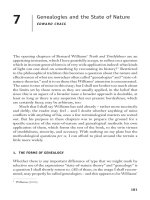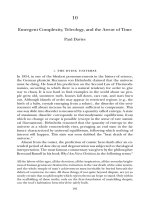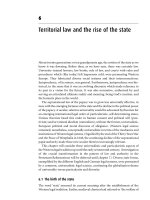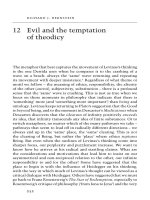Evil and the temptation of theodicy
Bạn đang xem bản rút gọn của tài liệu. Xem và tải ngay bản đầy đủ của tài liệu tại đây (138.76 KB, 16 trang )
richard j. bernstein
12 Evil and the temptation
of theodicy
The metaphor that best captures the movement of Levinas’s thinking
is the one Derrida uses when he compares it to the crashing of a
wave on a beach: always the ‘same’ wave returning and repeating
its movement with deeper insistence.
1
Regardless of what theme or
motif we follow – the meaning of ethics, responsibility, the alterity
of the other (autrui), subjectivity, substitution – there is a profound
sense that the ‘same’ wave is crashing. This is just as true when we
focus on those moments in philosophy that indicate that there is
‘something’ more (and ‘something more important’) than being and
ontology. Levinas keeps returning to Plato’s suggestion that the Good
is beyond being, and to the moment in Descartes’s Meditations when
Descartes discovers that the ideatum of infinity positively exceeds
its idea, that infinity transcends any idea of finite substances. Or to
switch metaphors, no matter which of the many pathways we take –
pathways that seem to lead off in radically different directions – we
always end up in the ‘same’ place, the ‘same’ clearing. This is not
the clearing of Being, but rather the ‘place’ where ethics ruptures
Being. But even when the outlines of Levinas’s thinking come into
sharper focus, our perplexity and puzzlement increase. We want to
know how he arrives at his radical and startling claims. What are
the considerations and motivations that lead him to insist on our
asymmetrical and non-reciprocal relation to the other, our infinite
responsibility to and for the other? Some have suggested that the
place to begin is with the influence of Heidegger on his thinking,
with the way in which much of Levinas’s thought can be viewed as a
critical dialogue with Heidegger
. Others have suggested that we must
go backto Franz Rosenzweig’s The Star of Redemption, especially to
Rosenzweig’s critique of philosophy (‘from Iona to Jena’) and the very
252
Evil and theodicy 253
idea of totality that never escapes from the horizon of the dialectic
of the same and the other. Still others have argued that the primary
source for Levinas’s understanding of ethics is to be found in his
interpretation of the Jewish Bible, and the Jewish rabbinic tradition
of commentary on the Bible. There is something right about all these
suggestions (which are not incompatible), but frankly I do not think
that they go deep enough. They do not answer the question why
does Levinas interpret and use these sources in the way he does?
The thesis that I want to explore and defend is that the primary
thrust of Levinas’s thought is to be understood as his response to the
horror of the evil that has erupted in the twentieth century. I believe
that Levinas’s entire philosophic project can best be understood as
an ethical response to evil – and to the problem of evil which we
must confront after the ‘end of theodicy’.
At first glance, such a thesis may seem paradoxical, because
Levinas does not thematize evil in any of his major works. In the
extensive secondary literature dealing
with Levinas,
‘evil’ (mal)is
barely even mentioned. Yet, like an ever-present ominous spectre,
evil casts its shadow over everything he has ever written. It is no exag-
geration to assert that Levinas’s confrontation with the ‘unspeakable’
evil of the twentieth century – where Auschwitz is the very paradigm
of this evil – has not only elicited his fundamental ethical response,
but has led him directly to his distinctive understanding of ethics.
I can illustrate what I mean by turning to the provocative opening
sentence of Totality and Infinity: ‘Everyone will readily agree that
it is of the highest importance to know whether we are not duped
by morality’ (
ti
21). What does it mean to be ‘duped’ by morality?
(Levinas
frequently uses the expressions
‘morality’ and ‘ethics’ in-
terchangeably, although he prefers ‘ethics’ which is derived from the
Greek ethos. Sometimes he does distinguish ‘ethics’ from ‘morality’
when he wants to distinguish ethics as first philosophy from the spe-
cific rules of morality.) In the paragraphs that follow this dramatic
opening, Levinas speakof politics, war and violence, introducing the
theme of totality. ‘War does not manifest exteriority and the other
as other; it destroys the identity of the same ...The visage of being
shows itself in war is fixed in the concept of totality, which domi-
nates Western philosophy’ (
ti
21). But the possibility of being duped
by morality means more than this. Consider his response to a ques-
tion he was asked in an interview when he was questioned about the
254 the cambridge companion to levinas
Greekand Jewish moments in his thought. Levinas insists that his
thought is Greek(i.e. philosophical):
Everything that I say about justice comes from Greekthought, and Greek
politics as well. But what I say, quite simply, is that it is, ultimately, based
on the relationship to the other, on the ethics without which I would not
have sought justice. Justice is the way in which I respond to the fact that
I am not alone in the world with the other. [
pm
174]
But what about the Jewish moment in his thought? He tells us:
If there is an explicitly Jewish moment in my thought, it is the reference to
Auschwitz, where God let the Nazis do what they wanted. Consequently,
what remains? Either this means that there is no reason for morality and
hence it can be concluded that everyone should act like the Nazis, or the
moral law maintains its authority ...
It still cannot be concluded that after Auschwitz there is no longer a moral
law, as if the moral or ethical law were impossible, without promise. Before
the twentieth century, all religion begins with the promise. It begins with
the ‘Happy End’. [
pm
176]
But for Levinas, it is not simply a ‘rhetorical’ question to askwhether
we can still believe in morality after Auschwitz. It is a deadly seri-
ous question, the most serious question that we must confront. ‘The
essential problem is: can we speakof an absolute commandment af-
ter Auschwitz? Can we speakof morality after the failure of moral-
ity’ (
pm
176)? Perhaps we really have been duped by morality. Both
Hannah Arendt and Hans Jonas (two other Jewish thinkers who
lived through the Nazi period) raised similar questions. Arendt (like
Levinas) believed that the evil that burst forth during the Nazi period
indicated a rupture with tradition, and revealed the total inadequacy
of traditional accounts of morals and ethics to deal with evil. She
declares ‘We ...have witnessed the total collapse of all established
moral standards in public and private life during the 1930s and 40s’
2
;
‘without much notice all this collapsed almost overnight and then it
was as though morality suddenly stood revealed ...as a set of mores,
customs and manners which could be exchanged for another set with
hardly more trouble than it would take to change the table manners
of an individual or a people.’
3
And Hans Jonas, in a passage that
mocks Hegel, says:
The disgrace of Auschwitz is not to be charged to some all-powerful prov-
idence or to some dialectically wise necessity, as if it were an antithesis
Evil and theodicy 255
demanding a synthesis or a step on the road to salvation. We human beings
have inflicted this on the deity, we who have failed in the administering of
his things. It remains on our account, and it is we who must again wash
away the disgrace from our own disfigured faces, indeed from the very coun-
tenance of God. Don’t talkto me here about the cunning of reason.
4
As the above quotations from Levinas (and from Jonas) make clear,
the question being raised is a question not only of morality, but also
of religion – specifically the question of theodicy. The problem of
evil, as traditionally conceived by philosophers and theologians, is
the problem of theodicy – the problem of how we can reconcile the
existence of evil (or the apparent existence of evil) with a faith in a
God who is omniscient, omnipotent and beneficient – a God who is
the creator of the universe and all living beings. In his essay ‘Use-
less Suffering’, Levinas explicitly takes up the question of theodicy
,
declaring that we are living in a time after ‘the end of theodicy’.
‘Perhaps the most revolutionary fact of the twentieth-century con-
sciousness ...is that of the destruction of all balance between explicit
and implicit theodicy of Western thought and the forms which suffer-
ing and its evil take in the unfolding of this century’ (
us
161). When
Levinas speaks of theodicy, he is not simply referring to the narrow
sense of theodicy introduced by Leibniz in the early eighteenth cen-
tury. Theodicy, in its broad sense, is ‘as old as a certain reading of the
Bible’. Levinas speaks of theodicy as a temptation – the seductive
temptation ‘in making God innocent, or in saving morality in the
name of faith, or in making suffering – and this is the true intention
of the thought that has recourse to theodicy – bearable’ (
us
161).
Theodicy, in this broad sense, is not only evidenced in the Chris-
tian doctrine of original sin, but is already implicit in the Jewish
Bible ‘where the drama of the Diaspora reflects the sins of Israel’
(
us
161). Lest we thinkthat theodicy is restricted to religious faith,
Levinas emphasizes that, in a secular age, theodicy has persisted
‘in a watered-down form at the core of atheist progressivism which
was confident, nonetheless, in the efficacy of the Good which is
immanent to being, called to visible triumph by the simple play of
the natural and historical laws of injustice, war, misery, and illness’
(
us
161). In short, theodicy, in its theological or secular forms, is
nothing but the temptation to find some sort of ‘justification,’ some
way to ‘reconcile’ ourselves to useless unbearable suffering. But in-
tellectual honesty demands that we recognize that theodicy is over.
256 the cambridge companion to levinas
‘The philosophical problem, then, which is posed by the useless pain
which appears in its fundamental malignancy across the events of the
twentieth century, concerns the meaning that religiosity and the hu-
man morality of goodness can still retain after the end of theodicy’
(
us
163). This is the problem that we must now confront.
We can appreciate the radicalness of Levinas’s statement of the
problem by comparing Levinas with Kant. Kant already criticized
theodicy as a theoretical problem because theodicy presupposes
that
we can have some knowledge (no matter how partial) of God’s at-
tributes (i.e. that God is (or is not) omnipotent, omniscient
and ben-
eficient). But such a theoretical knowledge is impossible. Further-
more, Kant begins his Religion Within the Limits of Reason Alone
by categorically declaring that morality ‘stands in need neither of the
idea of another Being over him, for him to apprehend his duty, nor an
incentive other than the law itself, for him to do his
duty.
...Hence
for its own sake morality does not need religion at all’.
5
Yet from
Levinas’s perspective, Kant does not resist the temptation of theod-
icy. He affirms it as the practical need to postulate a beneficient God.
Lurking in the background here is still the idea of ‘reconciliation’, the
‘promise’ – being worthy of ‘the Happy End’. This is precisely what
we must now give up. The phenomenon of Auschwitz demands (if
we are not duped by morality) that we conceive of ‘the moral law
independently of the Happy End’.
I want to clarify several preliminary issues that will help set the
context for probing Levinas’s ethical response to twentieth-century
evil. There is no doubt that Auschwitz (where most of Levinas’s
family were exterminated) is the ‘paradigm of gratuitous suffering,
where evil appears in its diabolical horror’ (
us
162). But
it is crucial to
realize that it is not exclusively the Jewish catastrophe that Levinas
singles out. Auschwitz itself is a paradigm or exemplar of a much
more general and pervasive phenomenon of evil. Levinas is explicit
about this:
This is the century that in thirty years has known two world wars, the total-
itarianisms of right and left, Hilterism and Stalinism, Hiroshima, the Gulag,
and the genocides of Auschwitz and Cambodia. This is a century which is
drawing to a close in the haunting memory of the return of everything sig-
nified by these barbaric names: suffering and evil are deliberately imposed,
yet no reason sets limits to the exasperation of reason become political and
detached from all ethics. [
us
162]
Evil and theodicy 257
Emphasizing that Auschwitz is a paradigm of the more general
phenomenon of evil enables us to better understand the subtle inter-
weaving of Greekand Jewish elements in Levinas’s thinking. Some-
times the contrast between Greekand Jew is overdrawn (even by
Levinas himself). I have already cited the passage in which Levinas
insists that his philosophic thought is essentially Greek. (To assert
that philosophic thought is Greekis redundant.) But it is just as im-
portant to realize that when Levinas weaves ‘Jewish’ elements into
his thinking, he is primarily concerned to highlight their universal
significance:
I do not preach the Jewish religion. I always speakof the Bible, not the Jewish
religion. The Bible, including the Old Testament, is for me a human fact, of
the human order, and entirely universal. What I have said about ethics, about
the universality of the commandment in the face of the commandment
which is valid even if it doesn’t bring salvation, even if there is no reward,
is valid independently of any religion. [Emphasis added,
pm
177]
But for all the distinctiveness of the evils of the twentieth century,
we can also hear the voices of Nietzsche and Dostoevsky speaking
through Levinas. Nietzsche was one of the most brilliant diagnosti-
cians of the human need to ‘justify’ suffering. And it was Nietzsche
who radically criticized theodicy – the ‘invention’ of God (gods) to
give meaning to and ‘justify’ this suffering:
What really arouses indignation against suffering is not suffering as such
but the senselessness of suffering: but neither for the Christian, who has
interpreted a whole mysterious machinery of salvation into suffering, nor for
the na
¨
ıve man of more ancient times, who understood all suffering in relation
to the spectator of it or the causer of it, was there any such thing as senseless
suffering. So as to abolish hidden, undetected,
unwitnessed suffering from
the world and honestly deny it, one was in the past virtually compelled to
invent gods and genii of all the heights and depths ...For it was with the aid
of such inventions that life knew how to work the trick which it has always
known how to work, that of justifying itself, of justifying its ‘evil’.
6
This is an idea that is also expressed by Dostoevsky. When Levinas
speaks about our essential asymmetrical relation to the other,
he frequently quotes the famous statement of Aloysa Karamazov:
‘Everyone is guilty in front of everyone else, and me more than
others.’ But we can also hear the voice of Ivan Karamazov’s diatribe
against the suffering of innocents. When Levinas speaks about the









